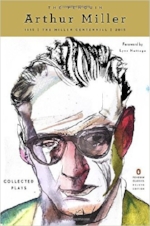After the Fall (1964)
by Arthur Miller.
This play feels like an extended psychotherapy session on Arthur Miller’s relationship with women and his parents and the anxiety of the McCarthy era. It is baldly autobiographical. The play is abstracted, experimental, moving away from the well-made-play form Miller excelled in, but not in a fully integrated way as we find with "Death of a Salesman." It centers on this concept of guilt that Miller constantly returns to in his plays. The central character, Quentin, is a middle-aged intellectual, who addresses an offstage listener/therapist in that annoying way that some plays/TV shows used in the 60s and 70s (e.g., "The Shadow Box"). The stage represents Quentin’s psyche, and characters appear as he remembers them. No doubt the experimental form could make for some interesting staging, but the play’s outsized scope and meandering focus ultimately keeps us outside of the dramatic question.
While it falters as a whole, “After the Fall” has some engaging segments. Particularly, I found the end of Act One intriguing, when the central character Quentin accuses himself of having a relieved response when his friend dies, a friend who might drag him into the McCarthy spotlight. It cleverly catches the audience in the same train of thought as the character, feeling that sense of relief when a plot complication is removed, even when that plot complication is the loss of someone’s life. The inherent narcissism we’re caught in is disturbing.
“I wanted out, to be a good American again, kosher again---and proved it in the joy… the joy . . . the joy I felt now that my danger had spilled out on the subway track! … This is not some crazy aberration of human nature to me… how can one understand that, if one is innocent? If somewhere in one’s soul there is no accomplice—of that joy, that joy, that joy when a burden dies . . . and leaves you safe?”
Also engaging is the play’s exposure of the broken psyche of Marilyn Monroe, in the character of Maggie, though perhaps it intrigues in that sick bystanderish way that so much Hollywood insider memoir is… Pure idolatry. The play certainly has Miller's intelligence and forceful, driving dramatic instinct. It just remains generally opaque emotionally because of its abstraction, scope, and lack of basic groundedness. Character urgency is not enough to hook us. There must be a clear crisis, a real world imbalance that promises a response of the central character and a possible way out. Here, we have a middle-aged guy facing existential despair as a new potential life-partner comes into his life. We get lots of puzzle pieces but no good glimpse of the picture on the box.
Abstracted plays, direct-address plays can work. In form, the play shares similarities with "Equus” and “The Glass Menagerie,” and even the modern masterpieces “Wit” and “How I Learned to Drive.” Those plays have a narrower scope and a clear crisis in the gravitational present—that is, the time period of the story when the play is most activated.
Recommendation: Audiences and General Readership can avoid it. Students of Arthur Miller, fans of Marilyn Monroe, and McCarthy era history buffs will find it fascinating for its historical/memoir content. Also, valuable for playwrights. Such broken, imperfect works are quite useful when you’re developing a sense of the bounds of effective dramaturgy.
Rating: 2 ½ stars. READ IT (for selective audience).
Next play by Arthur Miller>>
(Further Reading: "UNC's Paul Green: a like-mind in a different time")

